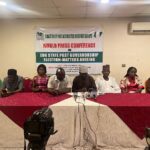By Emma Okereh
The National Human Rights Commission (NHRC), Wednesday, inaugurated the human rights defenders forum. The event took place simultaneously with a consultative meeting of the commission with civil society organizations on the state of human rights in the country.
In his speech at the occasion, the executive secretary of the commission, Dr Tony Ojukwu expressed his gratitude to the European Union Delegation for their partnership and support.
“It is both an honour and a privilege to welcome you all to this important Civil Society Consultation on the State of Human Rights in Nigeria, and to the inauguration of the Human Rights Defenders Forum.
I want to express my gratitude to the European Union Delegation for their partnership and support to the hosting of this event and for their support to the consolidation of democracy in Nigeria”.
He noted that the day marked a significant milestone in the collective efforts to advance human rights and protect the defenders who tirelessly work to uphold these rights, even in the face of adversity.
He further stated that the gathering was not only to discuss the current state of human rights in the country but also to chart a way forward—one that ensures greater protection for civil liberties, fosters democratic consolidation, and safeguards the fundamental rights of all Nigerians, especially those who stand up for the rights of others.
The executive secretary also said that the human rights landscape in Nigeria is a complex and evolving one, saying,
“While we have made strides, challenges remain, especially regarding the protection of civic space and the safety of human rights defenders. In recent years, we have witnessed alarming trends, including restrictions on the rights of individuals and organizations to operate freely, and threats against those who dare to speak truth to power. These developments serve as a stark reminder that the protection of human rights is an ongoing struggle that requires continuous vigilance, action, and cooperation from all sectors of society”, he said.
According to him, three major events preceded today’s events which are worth mentioning. “First was the End bad governance protests in August. The second is the arraignment of minors recently witnessed in Abuja. Third was the presentation of the report of the Special Independent Investigative Panel on Human Rights Violations in Counter-Insurgency Operations in the North East. These three events underscore the state of human rights in Nigeria and present for us discussion points on our institutions and mechanisms. Their outcomes also present us with hope and opportunities to base our present and future actions that will ensure that human rights of vulnerable Nigerians are protected”.
He submitted that “this consultation provides us with a unique opportunity to take stock of where we are, engage in constructive dialogue, and identify solutions to these pressing challenges”.
On the inauguration of the human rights defenders forum, Ojukwu says,
“The inauguration of the Human Rights Defenders Forum today underscores the importance of creating a unified platform for those who work at the frontlines of human rights protection. The forum will serve as a space for defenders to share experiences, exchange ideas, and strategize on how to address the myriad of challenges they face. It is crucial that we stand together to provide human rights defenders with the necessary support and ensure their safety at the frontlines.
Earlier, the deputy head of delegation, European Union, described the meeting and the theme as that which is not only essential but always incredibly timely and central to the European Union’s foreign policy, constituting its institutional core and soul:
“It is a profound honour to stand before you today and discuss a topic that is not only essential but always incredibly timely and central to the European Union’s foreign policy, constituting our institutional core and soul: our unwavering support for a continuous active, open and transparent dialogue on the state of democracy and human rights around the world including our host country, Nigeria, this great country and its great people that you represent here today”.
“We live in an era underlined by both remarkable advancements and unprecedented challenges; an era where we would have expected that global partnerships underlined by visionary and rationale conversations for a better and more inclusive world would have been the norm; instead we all see that the basic ingredients for such a successful recipe of hope and global solidarity are still missing; for us in the European Union, we firmly believe that democracy, inclusive societies and human rights are indispensable ingredients for such recipe to work; many solutions to the problems surrounding us originate from the inability to on-board the citizens of the world in a process of social, financial and political inclusion; simply to allow them to feel that they belong and that they can trust a shared societal project; we see it and feel it everywhere around us.
The 21st century has marked a new era where the degree of global adherence and consensus to human rights and democratic societies where every citizen is guaranteed a voice, continue to be in the centre of every conversation.
Unprecedented technological advancements have revolutionized communication, enabling global connectivity and the rapid dissemination of information, which has both empowered citizens’ activism but also posed new challenges for privacy and misinformation. Meanwhile, global conflicts and geopolitical shifts have highlighted the importance of international cooperation and the protection of human rights.
The collective consciousness on the urgent need to defend democracy and human rights is reflected upon the ever growing global citizens’ movements and advocacy for equality, justice, and inclusion; an urgent and pressing demand for societal change is present with youth in the forefront; it is important that we all listen and take stock.
The world is in an urgent need for peace, healing and reconciliation. Human rights, with their universal and inalienable qualities, offer a solid framework for conversation. Narratives of authoritarianism, populism, extremism, conflict entrepreneurship, compounded by poverty, inequality and increasingly the adverse impact of climate change on livelihoods risk to derail essential conversations on urgently needed global corrections and critical decisions regarding investment in a common future. Efforts to safeguard human dignity, freedom, and equality remain crucial.
The notion of global leadership in the mind of the citizens anywhere in the world, is strongly correlated with footprints of social, financial and political inclusion; the degree of success of such citizens’ ‘value chain’ depends on the fundamentals of inclusive democratic governance and human rights; there are no shortcuts and where they are tried they just disrupt and generate conflict and division.
Ladies and Gentlemen
With your permission, at this moment, I would also like to clarify an important point. As European Union, our intention is not to impose teachings on human rights, but to share our historical journey and experiences. Human rights have been fundamental in shaping inclusive, equitable, and resilient European societies. What we share with you today, is our collective post-World War II experience; democracy and human rights have been the cornerstone on which we have pursued and built collective peace, social justice, and prosperity; it remains always work in progress, we are fully conscious.
Still we sincerely feel that our story, recent story that started quite recently, in the 50s, demonstrates that upholding human rights is not just an ethical obligation, but a practical foundation for peace, inclusive development and social harmony.
Inside and outside the European Union, dialogue and partnerships shall remain our mainstream approach and method of choice; we recognise the need for continuous interfaces that facilitate the exchange of insights, allowing us to learn from one another, as a singular way in building partnerships and global communities rooted in mutual respect and dignity.
Equally important; as European Union we never claim that we have reached the end of this journey; if somebody follows for a moment our daily political life it could easily attest to a continuous introspection on a daily basis on what needs to be done more, what works and what doesn’t; the different views the different practices; it is a whole of society conversation simple citizens, civil society organisations, political parties, national assemblies, media, academia all hands in deck because we are aware that unless you ensure that the last citizen enjoys such rights, that the last citizen is included, the work is far from being done.
At this point in time, the European Union views the state of human rights in the world with a blend of concern and determination. While significant strides have been made, ongoing challenges persist, including differing world views in terms of societal organisation, authoritarianism, discrimination, inequality. The European Union acknowledges these global issues, steady in its support for multilateralism and its position that democracy is not merely a form of government but a pathway to citizen’s equal participation where every voice is heard, every vote counts, and every individual has the opportunity to contribute to the governance of their nation and benefit from its peace and prosperity dividends.
“Nigeria, as the largest democracy in Africa, plays a pivotal role in the continent’s political landscape. The other African countries, but also the world rightly so, are looking up to Nigeria and its multi-ethnic and multi-religious democratic trajectory and paradigms.
The European Union, recognises the importance of partnering with Nigeria in itinerary to democratic governance and human rights”.
He further said that the European Union’s support for dialogue on democracy and human rights in Nigeria and around the world is a testament but also a test to its enduring commitment to these fundamental principles. As we navigate the complexities of the modern world, the values of democracy and human rights must remain our guiding light.
“The EU’s efforts, in partnership with countries like Nigeria, are crucial in ensuring that these values are upheld and that every individual can enjoy the freedoms and dignity they deserve. We all know, that failure is not an option when it comes to consolidation of democracy, inclusive society and human rights”. He submitted.



